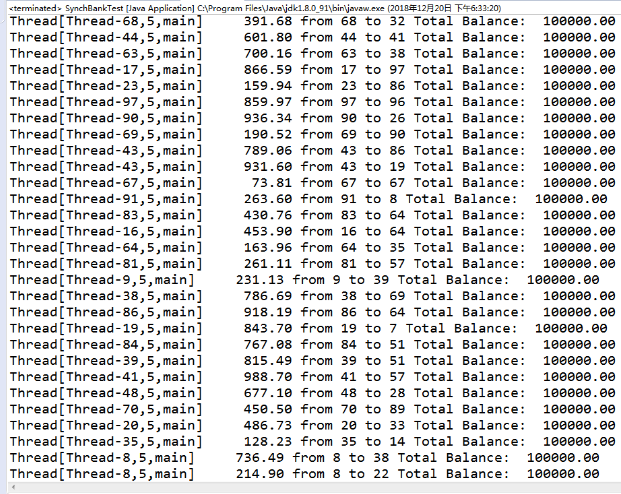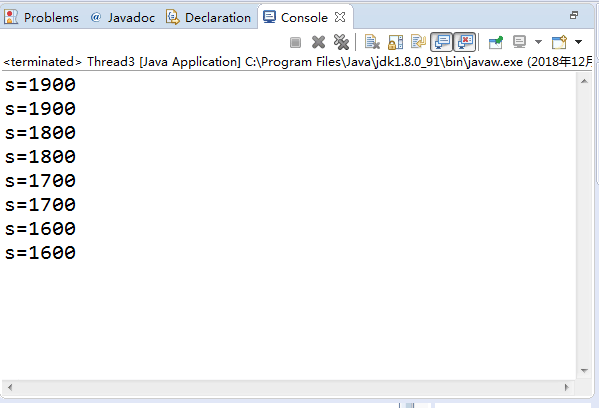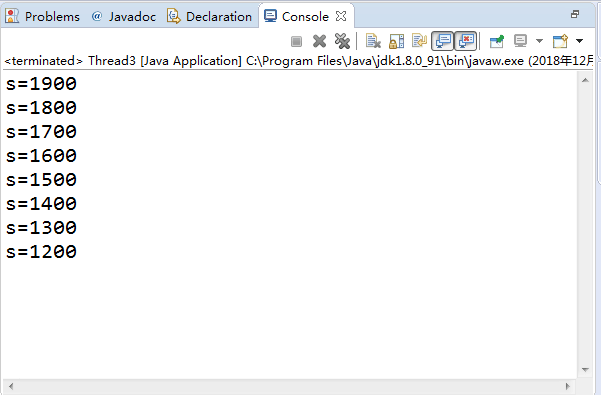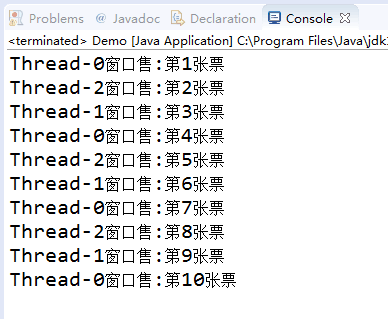1、实验目的与要求
(1) 掌握线程同步的概念及实现技术;
(2) 线程综合编程练习
2、实验内容和步骤
实验1:测试程序并进行代码注释。
测试程序1:
l 在Elipse环境下调试教材651页程序14-7,结合程序运行结果理解程序;
l 掌握利用锁对象和条件对象实现的多线程同步技术。
代码:
package synch; import java.util.*; import java.util.concurrent.locks.*; /** * A bank with a number of bank accounts that uses locks for serializing access. * @version 1.30 2004-08-01 * @author Cay Horstmann */ public class Bank { private final double[] accounts;//银行运转的基本数据 private Lock bankLock;//锁对象 private Condition sufficientFunds;// /** * Constructs the bank. * @param n the number of accounts * @param initialBalance the initial balance for each account */ public Bank(int n, double initialBalance) { accounts = new double[n]; Arrays.fill(accounts, initialBalance); bankLock = new ReentrantLock(); sufficientFunds = bankLock.newCondition(); } /** * Transfers money from one account to another. * @param from the account to transfer from * @param to the account to transfer to * @param amount the amount to transfer */ public void transfer(int from, int to, double amount) throws InterruptedException { bankLock.lock(); try {//锁对象的引用条件对象 while (accounts[from] < amount) sufficientFunds.await(); System.out.print(Thread.currentThread());//打印出线程号 accounts[from] -= amount; System.out.printf(" %10.2f from %d to %d", amount, from, to); accounts[to] += amount; System.out.printf(" Total Balance: %10.2f%n", getTotalBalance()); sufficientFunds.signal(); } finally { bankLock.unlock(); } } /** * Gets the sum of all account balances. * @return the total balance */ public double getTotalBalance() { bankLock.lock();//加锁 try { double sum = 0; for (double a : accounts) sum += a; return sum; } finally { bankLock.unlock();//解锁 } } /** * Gets the number of accounts in the bank. * @return the number of accounts */ public int size() { return accounts.length; } }
package synch; /** * This program shows how multiple threads can safely access a data structure. * @version 1.31 2015-06-21 * @author Cay Horstmann */ public class SynchBankTest { public static final int NACCOUNTS = 100; public static final double INITIAL_BALANCE = 1000; public static final double MAX_AMOUNT = 1000; public static final int DELAY = 10; public static void main(String[] args) { Bank bank = new Bank(NACCOUNTS, INITIAL_BALANCE); for (int i = 0; i < NACCOUNTS; i++) { int fromAccount = i; Runnable r = () -> { try { while (true) { int toAccount = (int) (bank.size() * Math.random()); double amount = MAX_AMOUNT * Math.random(); bank.transfer(fromAccount, toAccount, amount); Thread.sleep((int) (DELAY * Math.random())); } } catch (InterruptedException e) { } }; Thread t = new Thread(r); t.start(); } } }

测试程序2:
l 在Elipse环境下调试教材655页程序14-8,结合程序运行结果理解程序;
l 掌握synchronized在多线程同步中的应用。
代码:
package synch2; import java.util.*; /** * A bank with a number of bank accounts that uses synchronization primitives. * @version 1.30 2004-08-01 * @author Cay Horstmann */ public class Bank { private final double[] accounts; /** * Constructs the bank. * @param n the number of accounts * @param initialBalance the initial balance for each account */ public Bank(int n, double initialBalance) { accounts = new double[n]; Arrays.fill(accounts, initialBalance); } /** * Transfers money from one account to another. * @param from the account to transfer from * @param to the account to transfer to * @param amount the amount to transfer */ public synchronized void transfer(int from, int to, double amount) throws InterruptedException { while (accounts[from] < amount) wait();//导致线程进入等待状态直到它被通知。该方法只能在一个同步方法中调用。 System.out.print(Thread.currentThread());//打印出线程号 accounts[from] -= amount; System.out.printf(" %10.2f from %d to %d", amount, from, to);//第一个打印结果保留两位小数(最大范围是十位), accounts[to] += amount; System.out.printf(" Total Balance: %10.2f%n", getTotalBalance()); notifyAll();//解除那些在该对象上调用wait方法的线程阻塞状态。该方法只能在同步方法或同步块内部调用。 } /** * Gets the sum of all account balances. * @return the total balance */ public synchronized double getTotalBalance() { double sum = 0; for (double a : accounts) sum += a; return sum; } /** * Gets the number of accounts in the bank. * @return the number of accounts */ public int size() { return accounts.length; } }
package synch2; /** * This program shows how multiple threads can safely access a data structure, * using synchronized methods. * @version 1.31 2015-06-21 * @author Cay Horstmann */ public class SynchBankTest2 { public static final int NACCOUNTS = 100; public static final double INITIAL_BALANCE = 1000; public static final double MAX_AMOUNT = 1000; public static final int DELAY = 10; public static void main(String[] args) { Bank bank = new Bank(NACCOUNTS, INITIAL_BALANCE); for (int i = 0; i < NACCOUNTS; i++) { int fromAccount = i; Runnable r = () -> { try { while (true) { int toAccount = (int) (bank.size() * Math.random()); double amount = MAX_AMOUNT * Math.random(); bank.transfer(fromAccount, toAccount, amount); Thread.sleep((int) (DELAY * Math.random())); } } catch (InterruptedException e) { } }; Thread t = new Thread(r); t.start(); } } }

测试程序3:
l 在Elipse环境下运行以下程序,结合程序运行结果分析程序存在问题;
l 尝试解决程序中存在问题。
| class Cbank { private static int s=2000; public static void sub(int m) { int temp=s; temp=temp-m; try { Thread.sleep((int)(1000*Math.random())); } catch (InterruptedException e) { } s=temp; System.out.println("s="+s); } }
class Customer extends Thread { public void run() { for( int i=1; i<=4; i++) Cbank.sub(100); } } public class Thread3 { public static void main(String args[]) { Customer customer1 = new Customer(); Customer customer2 = new Customer(); customer1.start(); customer2.start(); } } |

修改后
class Cbank { private static int s=2000; public synchronized static void sub(int m) { int temp=s; temp=temp-m; try { Thread.sleep((int)(1000*Math.random())); } catch (InterruptedException e) { } s=temp; System.out.println("s="+s); } } class Customer extends Thread { public void run() { for( int i=1; i<=4; i++) Cbank.sub(100); } } public class Thread3 { public static void main(String args[]) { Customer customer1 = new Customer(); Customer customer2 = new Customer(); customer1.start(); customer2.start(); } }

实验2 编程练习
利用多线程及同步方法,编写一个程序模拟火车票售票系统,共3个窗口,卖10张票,程序输出结果类似(程序输出不唯一,可以是其他类似结果)。
Thread-0窗口售:第1张票
Thread-0窗口售:第2张票
Thread-1窗口售:第3张票
Thread-2窗口售:第4张票
Thread-2窗口售:第5张票
Thread-1窗口售:第6张票
Thread-0窗口售:第7张票
Thread-2窗口售:第8张票
Thread-1窗口售:第9张票
Thread-0窗口售:第10张票
代码:
package xaincheng; import java.nio.charset.MalformedInputException; public class Demo { public static void main(String[] args) { Mythread mythread= new Mythread(); Thread t1 = new Thread(mythread); Thread t2 = new Thread(mythread); Thread t3 = new Thread(mythread); t1.start(); t2.start(); t3.start(); } } class Mythread implements Runnable{ int t=1; boolean flag=true; public void run() { while(flag) { try { Thread.sleep(500); } catch (InterruptedException e) { e.printStackTrace(); } synchronized (this) { if(t<=10){ System.out.println(Thread.currentThread().getName()+"窗口售:第"+t+"张票"); t++; } if(t>10){ flag=false; } } } } }

实验总结:
这周学习的多线程处理技术,相对于前几周实验来说很简单,但是实验本来就是这样,是一个有难到易的过程.等把很多难的东西学过之后再回头发现,这些都很容易.